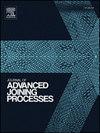Fe/polymer joining via Fe/TiB2 composite structures via in-situ laser-induced reaction of Fe-Ti-B system: Effect of powder composition
Abstract
Achieving strong direct joining between steel and polymers through mechanical interlocking is crucial for developing multi-material structures, particularly in the automotive and aerospace industries. This study synthesized micro-scale structures on a pure Fe substrate (simulating interstitial-free (IF) steel) for mechanical interlocking with thermoplastic parts. Numerous submillimeter-scale Fe/TiB2 composite particles were in-situ synthesized by laser scanning on the Fe-Ti-B powder mixture and well-bonded with the Fe substrate. The effects of powder composition (TiB2 volume fraction) on the morphology, microstructure, and joint strength with PA6 were investigated. A TiB2 volume fraction over 60 % was essential for the formation of the composite particles promoted by a TiB2 skeletal structure. Higher TiB2 volume fractions increased the area fraction of the composite particles and decreased the bonding ratio (adhesive) of the particles with the substrate due to poor adhesiveness at the edge of the laser-scanning line. A wider high-temperature region was generated at a higher TiB2 volume fraction, suggesting that the reaction heat to form TiB2 assisted the bonding of the particles with the substrate at the edge of the laser scanning line. The Fe/PA6 joint strength increased to approximately 30 MPa with increasing the TiB2 volume fraction to 100 % and showed a linear correlation with the product of particle area fraction and bonding ratio. A higher TiB2 volume fraction was preferable for enhancing the joint strength via the micro-scale structures synthesized by laser scanning on the Fe-Ti-B powder mixture. A combination of the micro-structuring process using a high fraction of TiB2 with advanced joining technologies will contribute to manufacturing high-strength Fe/polymer hybrid parts.

 求助内容:
求助内容: 应助结果提醒方式:
应助结果提醒方式:


